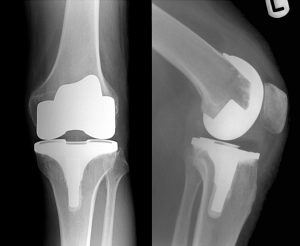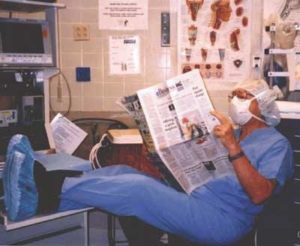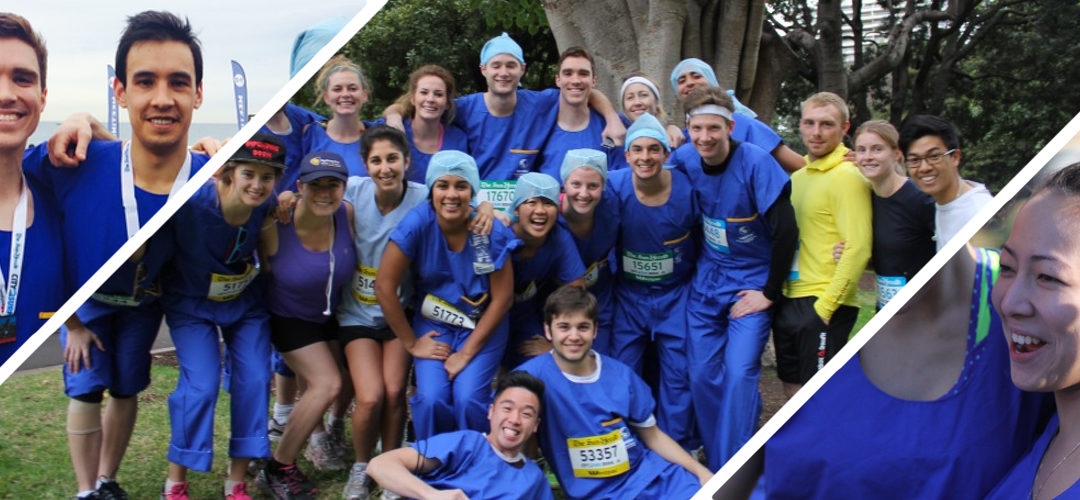
Post-operative X-rays of a total knee arthoplasty
In my first year of medical school in 2014 I became aware of some extra-curricular research opportunities made available through SUSS, working with an orthopaedic surgeon at Concord Repatriation General Hospital, Professor Warwick Bruce.
Even at this early stage of medical school I had an interest in orthopaedic surgery and had been considering pursuing this quite seriously. The research opportunity seemed like a good chance to develop my resume through scientific publications and conference presentations, as well as developing relationships and a network within the surgical community in Sydney.
The research project initially involved meeting with Professor Bruce and his fellow Dr. Yadin Levy in order to fine-tune the research project’s aims and scope. I was then able to go to Professor Bruce’s rooms in Sydney Olympic Park to complete data acquisition and for further consultation with Dr. Levy and Professor Bruce. After the data had been collected we were able to go through statistical analysis before completing the write-up process. Finally, we had the manuscript accepted for publication in the journal Knee Surgery, Sports Traumatology, Arthroscopy.
The experience this extra-curricular research provided put me in really good stead for the ensuing MD project that is part of the degree. Having completed an Honours year previously, this opportunity provided further experience in statistical analysis as well as scientific writing. In addition to this, the research was accepted as a conference poster at the American Academy of Orthopedics Annual Scientific Congress in 2016, as well as a peer-reviewed journal publication. Great things for a resume!
By Chris Shean, Stage 3 Year 4 (2017)
 With my interest in surgery as a career, I applied to the Surgical Outcomes Research Centre (SOuRCe) at RPA for my MD Project. At our first meeting, my MD Project group was asked about our individual goals and preferences for MD projects individually, and SOuRCe was flexible about our topics and made an effort to accommodate our requests.
With my interest in surgery as a career, I applied to the Surgical Outcomes Research Centre (SOuRCe) at RPA for my MD Project. At our first meeting, my MD Project group was asked about our individual goals and preferences for MD projects individually, and SOuRCe was flexible about our topics and made an effort to accommodate our requests.
I was quite clear about the type of project that I wanted to do; my main concerns were time commitment and scope of the project. The tutors, Professor Michael Solomon and Professor Jane Young, suggested the theme of Trauma Surgery, which is relevant to different surgical specialties such as Orthopaedics, Neurosurgery, and General Surgery. They introduced me to Dr. Michael Dinh, an Emergency Physician and the director of trauma services at RPA.
Dr. Dinh has an ongoing research interest in trauma cases related to ladder falls, particularly in the elderly. He proposed that I use the trauma registry at RPA to test a specific hypothesis for my research; however, he also gave me liberty to define my own research question. Ladder falls as an MD project may sound quite niche but a recent retrospective study conducted over a five-year period reported that in NSW alone, ladder falls have cost about $52M and exposed patients to 57,000 procedures. This shows that ladder falls are a major burden for Australian healthcare. Eventually we decided to combine trauma registry and electronic medical records data to investigate the effect of comorbidities on ladder falls and surgical outcomes.
Diabetes mellitus (DM) is a global burden both in developed and emerging countries. Its multiple systemic complications, including retinopathy, peripheral arterial disease, cardiovascular disease, kidney disease, neuropathy, and poor wound healing, can lend themselves to falls as well as poor surgical recovery. Therefore, I decided to test the effect of DM as a comorbidity on the outcomes of ladder falls and their surgical treatments.
The MD research project is a wonderful opportunity to explore an interest in surgery, find contacts in your field of interest, and exercise all the skills that we learned during the Research Methods block. When choosing your topic, I recommend keeping your project as simple as possible given the medicine course load, and rely on your strengths. For example, I wanted to work with data to use my programming skills. I also wanted to stay as far away as I could from a wet lab, animal experiments, data collection, or ethical issues due to a lack of experience! Also, I suggest that you maintain as broad a scope as possible to keep your experience relevant to as many different specialties as possible, both medical and surgical. For example, a topic related to wound healing, diabetes, or sepsis can be fit into almost every specialty (well, maybe not psychiatry). Ideally, you want something that can be turned into a research article easily and published when you are in third or early fourth year. It would also be beneficial to be able to define follow-up questions that can be easily studied and published after your MD project.
By Luke Massey, Stage 3 Year 3 (2017)




